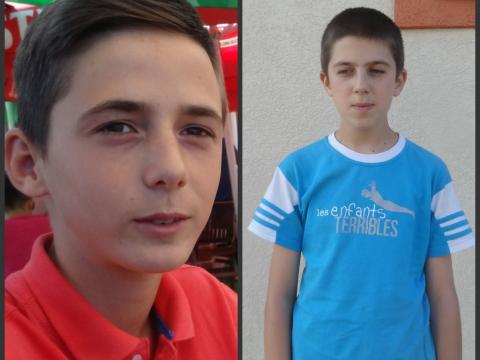Kids for peace prescribe a treatment for open wounds in Kosovo

Taulant, 15, doesn’t remember his grandfather. He was just under 2-years-old when he was killed, in 1999. “He was killed by Serbs in an ambush,” he says, well aware of his country’s history and his family’s story.
“For entire years,” he says, “his absence caused so much sadness in our family.” Last year his grandfather’s body was found buried.
While Taulant might not have any of his own memories from the conflict, he knows it was a very difficult year for Kosovo. Like his grandfather, thousands of people were killed in the conflict. And, although Kosovo is now a country with relative peace between Serbians and ethnic Albanians, the resentment between the two sides is still evident every day.
For many, the pain from the past effects their present circumstances and prohibits them finding a brighter future as a united country.
Taulant is different. He speaks with such a passion for peace. He is like a young Martin Lunther King, inspiring and encouraging those around him.
"I have a vision for the future and that vision is real peace between Serbs and Albanians. It is possible," he says, with excitement and determination.
For Taulant, it is encouraging to see how his parents support him in his peace-promotion efforts, even though they are still hurting from the loss of Taulant’s grandfather.
In addition to his family, Taulant is also supported by World Vision, whose largest project in Kosovo is a project called Kids for Peace. The project has initiated dozens of peace clubs in villages of Kosovo; creating spaces where Serbs, Albanian and other children from minority groups who live in Kosovo learn to live together – to know and accept each other.
Taulant joined the Kids for Peace club in his community last year. He believes with all his heart that peace is an option.
"Taulant just came back from a summer camp organized by World Vision. He spent the nights staying and sleeping in the same room with one of his Serbian friends. His open nature and his leadership skills inspire us all," says Vjollca Racaj, Project Coordinator of World Vision, in Kosovo.
“Peace is the most important thing in the world, without peace there is no future,” says Taulant, sharing about his Serbian friend, Djordje. “He is very nice and we go often out to play together. Even our houses are close to each-other.”
Following the examples of his heroes, like Nelson Mandela, Taulant is not of those who only speaks; he acts, as well. His leadership skills have greatly influenced his school life. Smiling, he says that together with his friend, Argonita, he goes regularly to the school principal, to bring him ideas. "The director always supports us. We have submitted ideas on how to fix the school yard, how to build a playground there, how to get tools for our laboratory and computers for the school by sending a letter to one of the foreign embassies here,” he shares, noting that each of their ideas have been completed.
A growing movement
In another village in Kosovo, David Djokic, 12, shares Taulant’s passion for peace even though the boys are of different ethnicities. David is a Serb, but he too speaks about the possibility of peace between Serbs and Albanians and initiatives he has undertaken to improve the lives and living conditions for people in his community. "I think it is important that Albanians and Serbs stay together, to know each other better. In this way, the whole life of our community will be improved," he says, smiling, knowing the challenges that exist to reach this ideal. "Many people do not believe in what I believe… but I think we can all live in peace and we can have normal relations with Albanians, here in the village," he says.
A year ago, when he was just 11 years old, David took a chance and made a public speech in front of his fellow students, their parents, and his teachers. "I said that Albanians and Serbs should come together more often, just to spend time with each other," he remembers.
The work of David and the other members of the Kids for Peace club in Rubofc/Rabovce is beginning to bear fruit. “We are seeing more and more Serbs and Albanians staying with each other,” he says, noting that change in his village is just the beginning of overall change in Kosovo. “Rubovc is a small village,” he says. “I think it is time to go to other villages and show our experience."
"We must make better our lives,” he emphasizes. “We should build a better Rubofc/Rabovce,” he says, noting how a community playground or park would help the children from different backgrounds have the chance to spend more time together, growing up to be friends, not adversaries.
Taulant and David: the first one Albanian and the second one Serbian, live in a land that has seen so much carnage and where daily life is often dictated by the scars of the past. Despite the past, they know that a different future is possible.
They are equally determined to heal Kosovo. History has shown that miracles happen—even those who are totally unimaginable.